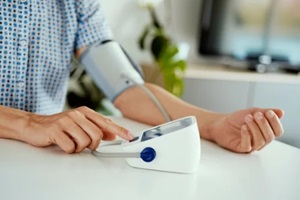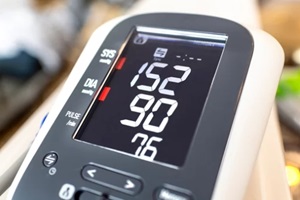 Keeping tabs on your blood pressure is an important part of managing hypertension and taking care of your health. Self-monitoring blood pressure at home allows you to track your numbers over time and partner with your doctor to ensure treatments are working.
Keeping tabs on your blood pressure is an important part of managing hypertension and taking care of your health. Self-monitoring blood pressure at home allows you to track your numbers over time and partner with your doctor to ensure treatments are working.
By following key tips for properly and accurately checking blood pressure at home, you can become informed, empowered, and actively involved in controlling high blood pressure.
Choose an Appropriate Home Blood Pressure Monitor
When picking a home blood pressure monitor, it’s important to choose a validated arm-cuff monitor instead of a wrist or finger unit. Wrist and finger devices may be more convenient and portable, but the readings tend to be less reliable.
Look for a monitor that has been independently tested and confirmed as accurate according to international standards. Validated monitors will have published evidence showing they provide precise measurements.
If you’re unsure whether a monitor is validated, consult your pharmacist or check a reputable published validation list online.
To produce an accurate reading, ensure the cuff size properly fits the circumference of your upper arm. Measure around your bicep and choose a monitor with the proper cuff size rather than relying on a one-size-fits-all cuff.
Once you’ve chosen a monitor, show it to your doctor so they can check that you’re using the equipment correctly and getting comparable readings to the office equipment.
Follow the Proper Measuring Technique
In addition to using the right equipment, following the proper technique when taking your blood pressure measurements at home is essential.
 Sit correctly, meaning that your back should be straight and supported, typically in a straight-backed chair rather than on a soft sofa, with your feet resting flat on the floor and legs uncrossed.
Sit correctly, meaning that your back should be straight and supported, typically in a straight-backed chair rather than on a soft sofa, with your feet resting flat on the floor and legs uncrossed.
Support your arm at heart level on a table or other level surface. Make sure the blood pressure cuff is securely wrapped around your bare upper arm just above the elbow bend.
Measure your blood pressure at the same time daily, such as early in the morning and late in the evening, to detect meaningful patterns.
Consistency provides a clear picture of your average blood pressure rather than random fluctuations throughout the day.
Also, in the same session, take at least two readings approximately a minute apart and log the results. Multiple readings give a more reliable measure since blood pressure can vary from beat to beat.
When recording your readings, note the time of day and any factors that may impact the values, such as feeling particularly stressed or having just exercised.
Recording detailed contextual notes allows you and your doctor to best interpret the readings.
Interpret Your Blood Pressure Readings
Along with properly gathering accurate measurements, understanding what your home blood pressure readings mean is key to effective self-monitoring.
 Learn the standard blood pressure categories, recognizing normal, elevated, and high blood pressure ranges based on the systolic (top) and diastolic (bottom) numbers.
Learn the standard blood pressure categories, recognizing normal, elevated, and high blood pressure ranges based on the systolic (top) and diastolic (bottom) numbers.
Know which zones indicate potentially concerning hypertension that needs medical attention versus normal fluctuation.
Carefully identify any unusually high or low readings that may signal issues such as underlying health conditions or accuracy problems with your monitor or technique.
A single abnormal high or low reading might not seem concerning, but it’s still wise to inform your doctor so they can determine whether further investigation is required.
It’s also important to review your logged readings over the previous days, weeks, and months to detect trends and patterns.
Self-monitoring allows you to relate blood pressure changes to medication adjustments, lifestyle factors, and health events to determine what works to control your hypertension.
Partner with Your Doctor
The main reason you should self-monitor your blood pressure is to make it easier for you and your doctor to manage your hypertension.
Therefore, make sure to share your carefully logged home blood pressure readings with your doctor to determine whether medications and treatments are working or need adjustment.
Home monitoring data is an important supplement to in-office readings, allowing your doctor to optimize your treatment.
So, make sure to discuss any unusually high or low home readings promptly with your doctor to check for potential health concerns and the accuracy of your monitor and measurement procedure.
Don’t stop or change prescribed hypertension medications without explicit guidance, even if your blood pressure normalizes at home. Some medications must be reduced slowly over time to avoid complications.
Recheck Monitor Accuracy
The accuracy of blood pressure monitors can drift over time. To ensure precision, it’s advisable to get your home blood pressure monitor inspected annually.
 Bring your monitor to routine doctor’s appointments to compare your device’s readings against the office equipment. Significant discrepancies may indicate your monitor requires recalibration.
Bring your monitor to routine doctor’s appointments to compare your device’s readings against the office equipment. Significant discrepancies may indicate your monitor requires recalibration.
Replace batteries regularly per the manufacturer’s recommendations to maintain accuracy. Consider the date you started using your monitor to plan for periodic replacement, as most have a usable lifespan of 5-10 years before they must be replaced.
Expert Guidance for Blood Pressure Monitoring at Home from Imperial Center Family Medicine
While home monitoring is invaluable for hypertension management, it should never replace regular professional care. Instead, view accurate at-home tracking of blood pressure trends as a complementary tool to guide treatment decisions with your doctor.
Imperial Center Family Medicine’s team of expert healthcare providers can offer you all the assistance you need to manage your hypertension.
From showing you how to take your own measurements to work with you on an effective treatment plan, our team of experts will help you improve your heart health. Contact us today at 919-873-4437 or online to set up a consultation.
